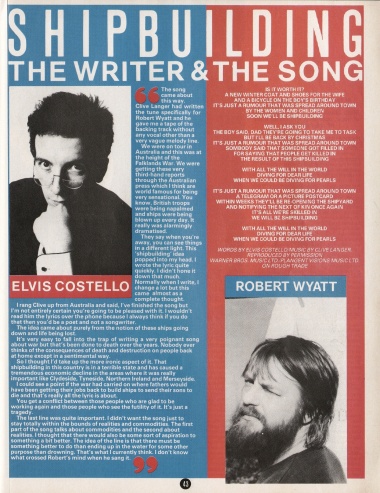Smash Hits, May 26, 1983: Difference between revisions
(start page) |
(formatting / update external links / +tags) |
||
| (8 intermediate revisions by the same user not shown) | |||
| Line 1: | Line 1: | ||
{{Bibliography header}} | {{Bibliography header}} | ||
{{Bibliography index}} | {{:Bibliography index}} | ||
{{Smash Hits index}} | {{:Smash Hits index}} | ||
{{ | {{:UK & Ireland magazines index}} | ||
{{Bibliography article header}} | {{Bibliography article header}} | ||
<center><h3> Shipbuilding </h3></center> | <center><h3> Shipbuilding </h3></center> | ||
<center>''' | <center>''' The writer and the song </center> | ||
---- | ---- | ||
<center> Ian Birch </center> | <center> Ian Birch </center> | ||
---- | ---- | ||
{{Bibliography text}} | {{Bibliography text}} | ||
"The song came about this way. Clive Langer had written the tune specifically for Robert Wyatt and he gave me a tape of the backing track without any vocal other than a very vague melody line. | |||
"We were on tour in Australia and this was at the height of the Falklands War. We were getting these very third-hand reports through the Australian press which I think are world famous for being very sensational. You know, British troops were being napalmed and ships were being blown up every day. It really was alarmingly dramatised. | |||
"They say when you're away, you can see things in a different light. This 'shipbuilding' idea popped into my head. I wrote the lyric quite quickly. I didn't hone it down that much. Normally when I write, I change a lot but this came almost as a complete thought. | |||
"I rang Clive up from Australia and said, I've finished the song but I'm not entirely certain you're going to be pleased with it. I wouldn't read him the lyrics over the phone because I always think if you do that then you'd be a poet and not a songwriter. | |||
"The idea came about purely from the notion of these ships going down and life being lost. | |||
"It's very easy to fall into the trap of writing a very poignant song about war but that's been done to death over the years. Nobody ever thinks of the consequences of death and destruction on people back at home except in a sentimental way. | |||
"So I thought I'd take up the more ironic aspect of it. That shipbuilding in this country is in a terrible state and has caused a tremendous economic decline in the areas where it was really important like Clydeside, Tyneside, Northern Ireland and Merseyside. | |||
"I could see a point if the war had carried on where fathers would have been getting their jobs back to build ships to send their sons to die and that's really all the lyric is about. | |||
"You get a conflict between those people who are glad to be working again and those people who see the futility of it. It's just a tragedy. | |||
"The last line was quite important. I didn't want the song just to stay totally within the bounds of realities and commodities. The first part of the song talks about commodities and the second about realities. I thought that there would also be some sort of aspiration to something a bit better. The idea of the line is that there must be something better to do than ending up in the water for some other purpose than drowning. That's what I currently think. I don't know what crossed Robert's mind when he sang it. | |||
{{cx}} | |||
{{tags}}[[Shipbuilding]] {{-}} [[Clive Langer]] {{-}} [[Robert Wyatt]] {{-}} [[Merseyside]] {{-}} [[Northern Ireland]] | |||
{{cx}} | {{cx}} | ||
| Line 19: | Line 39: | ||
{{Bibliography notes}} | {{Bibliography notes}} | ||
{{Bibliography next | {{Bibliography next | ||
|prev = Smash Hits, | |prev = Smash Hits, March 17, 1983 | ||
|next = Smash Hits, June 9, 1983 | |next = Smash Hits, June 9, 1983 | ||
}} | }} | ||
'''Smash Hits, May 26 - June 8, 1983 | '''Smash Hits, May 26 - June 8, 1983 | ||
---- | ---- | ||
[[Ian Birch]] | [[Ian Birch]] talks to Elvis Costello about "[[Shipbuilding]]." | ||
{{Bibliography images}} | {{Bibliography images}} | ||
[[image:1983-05-26 Smash Hits page 43.jpg|380px]] | |||
<br><small>Page scan.</small> | |||
<small>Photo by [[David Bailey]].</small><br> | |||
[[image:1983-09-15 Smash Hits photo 01 db.jpg|300px]] | |||
<small>Cover and contents page.</small><br> | |||
[[image:1983-05-26 Smash Hits cover.jpg|x120px|border]] | [[image:1983-05-26 Smash Hits cover.jpg|x120px|border]] | ||
[[image:1983-05-26 Smash Hits page 03.jpg|x120px | [[image:1983-05-26 Smash Hits page 03.jpg|x120px]] | ||
{{Bibliography notes footer}} | {{Bibliography notes footer}} | ||
| Line 42: | Line 69: | ||
==External links== | ==External links== | ||
*[http://en.wikipedia.org/wiki/Smash_Hits Wikipedia: Smash Hits] | *[http://en.wikipedia.org/wiki/Smash_Hits Wikipedia: Smash Hits] | ||
*[ | *[https://www.flickr.com/photos/51106326@N00/sets/72157633135903822/ Flickr: Brian McCloskey][https://www.flickr.com/photos/51106326@N00/8607774828/in/album-72157633135903822/ {{t}}] | ||
*[https://www.flickr.com/photos/57779449@N02/albums/72157719109038720 Flickr: Michael Kane][https://www.flickr.com/photos/57779449@N02/51145922642/ {{t}}] | |||
*[https://worldradiohistory.com/Smash-Hits-UK.htm worldradiohistory.com] | |||
*[https://archive.org/details/smash-hits-26-may-8-june-1983/page/n41/mode/2up archive.org] | |||
{{DEFAULTSORT:Smash Hits 1983-05-26}} | |||
[[Category:Bibliography 1983 | [[Category:Bibliography]] | ||
[[Category:Bibliography 1983]] | |||
[[Category:Smash Hits| Smash Hits 1983-05-26]] | [[Category:Smash Hits| Smash Hits 1983-05-26]] | ||
[[Category:Magazine articles | [[Category:Magazine articles]] | ||
[[Category: | [[Category:Interviews]] | ||
[[Category:1983 interviews]] | |||
Latest revision as of 17:27, 29 April 2021
|



